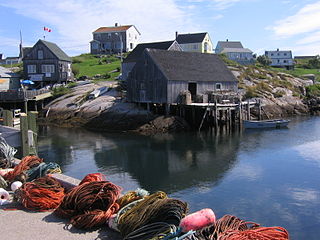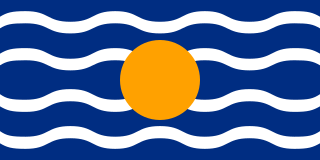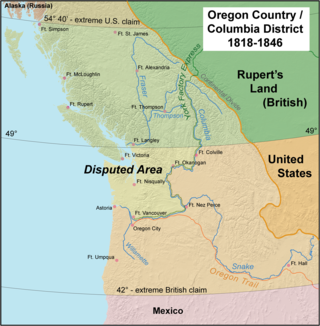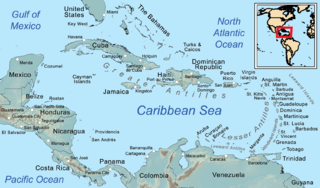
The Maritimes, also called the Maritime provinces, is a region of Eastern Canada consisting of three provinces: New Brunswick, Nova Scotia, and Prince Edward Island. The Maritimes had a population of 1,899,324 in 2021, which makes up 5.1% of Canada's population. Together with Canada's easternmost province, Newfoundland and Labrador, the Maritime provinces make up the region of Atlantic Canada.

The British colonization of the Americas is the history of establishment of control, settlement, and colonization of the continents of the Americas by England, Scotland and, after 1707, Great Britain. Colonization efforts began in the late 16th century with failed attempts by England to establish permanent colonies in the North. The first of the permanent English colonies in the Americas was established in Jamestown, Virginia in 1607. Approximately 30,000 Algonquian peoples lived in the region at the time. Over the next several centuries more colonies were established in North America, Central America, South America, and the Caribbean. Though most British colonies in the Americas eventually gained independence, some colonies have opted to remain under Britain's jurisdiction as British Overseas Territories.

Canadian Confederation was the process by which three British North American provinces—the Province of Canada, Nova Scotia, and New Brunswick—were united into one federation called the Dominion of Canada, on July 1, 1867. Upon Confederation, Canada consisted of four provinces: Ontario and Quebec, which had been split out from the Province of Canada, and the provinces of Nova Scotia and New Brunswick. Over the years since Confederation, Canada has seen numerous territorial changes and expansions, resulting in the current number of ten provinces and three territories.

The Lesser Antilles are a group of islands in the Caribbean Sea. Most of them are part of a long, partially volcanic island arc between the Greater Antilles to the north-west and the continent of South America. The islands of the Lesser Antilles form the eastern boundary of the Caribbean Sea where it meets the Atlantic Ocean. Together, the Lesser Antilles and the Greater Antilles make up the Antilles. The Lesser and Greater Antilles, together with the Lucayan Archipelago, are collectively known as the West Indies.

The West Indies Federation, also known as the West Indies, the Federation of the West Indies or the West Indian Federation, was a short-lived political union that existed from 3 January 1958 to 31 May 1962. Various islands in the Caribbean that were part of the British Empire, including Trinidad and Tobago, Barbados, Jamaica, and those on the Leeward and Windward Islands, came together to form the Federation, with its capital in Port of Spain, Trinidad and Tobago. The expressed intention of the Federation was to create a political unit that would become independent from Britain as a single state — possibly similar to the Canadian Confederation, Australian Commonwealth, or Central African Federation. Before that could happen, the Federation collapsed due to internal political conflicts over how it would be governed or function viably. The formation of a West Indian Federation was encouraged by the United Kingdom, but also requested by West Indian nationalists.

British North America comprised the colonial territories of the British Empire in North America from 1783 onwards. English colonisation of North America began in the 16th century in Newfoundland, then further south at Roanoke and Jamestown, Virginia, and more substantially with the founding of the Thirteen Colonies along the Atlantic coast of North America.

Abraham Alfonse Albert Gallatin was a Genevan–American politician, diplomat, ethnologist and linguist. Often described as "America's Swiss Founding Father", he was a leading figure in the early years of the United States, helping shape the new republic's financial system and foreign policy. Gallatin was a prominent member of the Democratic-Republican Party, represented Pennsylvania in both chambers of Congress, and held several influential roles across four presidencies, most notably as the longest serving U.S. Secretary of the Treasury. He is also known for his contributions to academia, namely as the founder of New York University and cofounder of the American Ethnological Society.

The British West Indies (BWI) were colonised British territories in the West Indies: Anguilla, the Cayman Islands, Turks and Caicos Islands, Montserrat, the British Virgin Islands, Antigua and Barbuda, The Bahamas, Barbados, Dominica, Grenada, Jamaica, Saint Kitts and Nevis, Saint Lucia, Saint Vincent and the Grenadines, British Guiana and Trinidad and Tobago. Other territories include Bermuda, and the former British Honduras. The colonies were also at the centre of the transatlantic slave trade, around 2.3 million slaves were brought to the British Caribbean. Before the decolonisation period in the later 1950s and 1960s the term was used to include all British colonies in the region as part of the British Empire. Following the independence of most of the territories from the United Kingdom, the term Commonwealth Caribbean is now used.

The Oregon Treaty is a treaty between the United Kingdom and the United States that was signed on June 15, 1846, in Washington, D.C. The treaty brought an end to the Oregon boundary dispute by settling competing American and British claims to the Oregon Country; the area had been jointly occupied by both Britain and the U.S. since the Treaty of 1818.

The Atlantic Time Zone is a geographical region that keeps standard time—called Atlantic Standard Time (AST)—by subtracting four hours from Coordinated Universal Time (UTC), resulting in UTC−04:00. AST is observed in parts of North America and some Caribbean islands. During part of the year, some portions of the zone observe daylight saving time, referred to as Atlantic Daylight Time (ADT), by moving their clocks forward one hour to result in UTC−03:00. The clock time in this zone is based on the mean solar time of the 60th meridian west of the Greenwich Observatory.

The Annexation Bill of 1866 was a bill introduced on July 2, 1866, but never passed in the United States House of Representatives. It called for the annexation of British North America and the admission of its provinces as states and territories in the Union. The bill was sent to committee but never came back, was never voted upon, and did not become law. The bill never came to the United States Senate.

The term British West Indies refers to the former English and British colonies and the present-day overseas territories of the United Kingdom in the Caribbean.

British America comprised the colonial territories of the English Empire, and the successor British Empire, in the Americas from 1607 to 1783. These colonies were formally known as British America and the British West Indies just before the thirteen of the colonies declared their independence in the American Revolution (1765–1791) and formed the United States of America.

Starting with the 1763 Treaty of Paris, New France, of which the colony of Canada was a part, formally became a part of the British Empire. The Royal Proclamation of 1763 enlarged the colony of Canada under the name of the Province of Quebec, which with the Constitutional Act 1791 became known as the Canadas. With the Act of Union 1840, Upper and Lower Canada were joined to become the United Province of Canada.
British Canadians primarily refers to Canadians who were either born in or can trace their ancestry to the British Isles, which includes the nations of England, Ireland, Scotland, Wales, and Northern Ireland.

The Caribbean is a subregion of the Americas that consists of the Caribbean Sea and its islands ; the nearby coastal areas on the mainland may also be included. The region is southeast of the Gulf of Mexico and the North American mainland, east of Central America, and north of South America.

This is a timeline of the territorial evolution of the Caribbean and nearby areas of North, Central, and South America, listing each change to the internal and external borders of the various countries that make up the region.

A number of states and polities formerly claimed colonies and territories in Canada prior to the evolution of the current provinces and territories under the federal system. North America prior to colonization was occupied by a variety of indigenous groups consisting of band societies typical of the sparsely populated North, to loose confederacies made up of numerous hunting bands from a variety of ethnic groups, to more structured confederacies of sedentary farming villages, to stratified hereditary structures centred on a fishing economy. The colonization of Canada by Europeans began in the 10th century, when Norsemen explored and, ultimately unsuccessfully, attempted to settle areas of the northeastern fringes of North America. Early permanent European settlements in what is now Canada included the late 16th and 17th century French colonies of Acadia and Canada, the English colonies of Newfoundland (island) and Rupert's Land, the Scottish colonies of Nova Scotia and Port Royal.
















